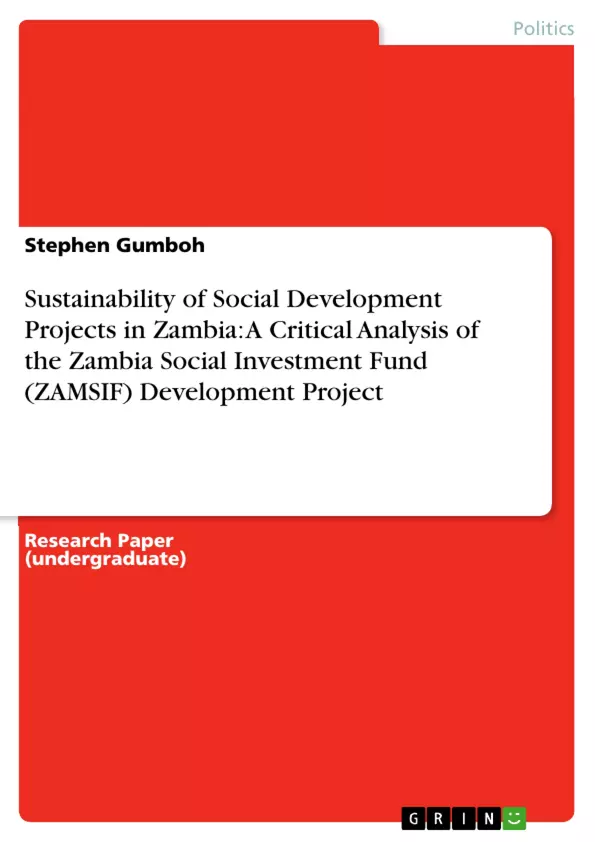The paper provides a critical analysis of a social development project in Zambia in terms of its sustainability after the cessation of donor or local financial support. Specifically, the paper focuses on the challenges experienced in the implementation of such a project and the measures devised for its sustainability. The Zambia Social Investment Fund (ZAMSIF) development project regarded as an all- embracing project with coverage of almost every aspect of a full –fledged social development project is used as the case study.
The study underscores a number of significant achievements of the ZAMSIF project, suggestive of the project’s effectiveness as one single largest poverty reduction programme in Zambia. The project implementation process embraces upward and downward accountability with direct ownership and resource cost contribution into the project by most of the communities for effective implementation and sustainability. Some of the challenges encountered in the implementation process are elucidated in the paper.
Table of Contents
- Introduction
- Development and the Poverty Challenge
- Statement of the Problem
- Objective of the Study
- Study Methodology
- Literature Review
- Social Development Concept
- Projects as Stimuli of Social development
- Core Actors in Social Development Projects
- Stakeholder Participation in Social Development Projects
- Sustainability of Social Development Project
- Case Study - ZAMSIF Project
- ZAMSIF Project Development Objective
- ZAMSIF Project Institutional Arrangements
- ZAMSIF Project Components
- Community Investment Fund (CIF)
- District Investment Fund (DIF)
- Poverty Monitoring and Analysis (PMA)
- Institutional Support (IS)
- Study Findings and Comments
- General Analysis of Project Implementation and Outcomes
- Availability of Improved Infrastructure and Accessibility – Outcome Indicator (1)
- Capacity Building for Improved Local Governance - Outcome Indicator (2)
- Poverty and Social Information Systems - Outcome Indicator (3)
- Project Sustainability
- Challenges of ZAMSIF Project Implementation
- Negative and Positive Factors to Project Implementation
- Government Performance during Project Implementation
- IDA's Performance during Project Implementation
- Major Lessons Learnt from the Study
- General Analysis of Project Implementation and Outcomes
Objectives and Key Themes
This paper critically analyzes the sustainability of a social development project in Zambia after the cessation of donor or local financial support. The paper uses the Zambia Social Investment Fund (ZAMSIF) development project as a case study, highlighting its challenges and sustainability measures. The key objective of the study is to provide a comprehensive understanding of the ZAMSIF project's effectiveness, particularly in relation to poverty reduction. The key themes explored in the paper are:- Project Sustainability
- Social Development
- Stakeholder Participation
- Community Investment Fund
- Decentralization
Chapter Summaries
The introduction of the paper sets the context for the study, highlighting the challenges of poverty and development in Zambia. It lays out the problem statement, focusing on the criticisms of the sustainability of donor-funded projects in Zambia. The literature review delves into the concepts of social development and the role of projects in stimulating social development. The chapter explores core actors in social development projects, emphasizing stakeholder participation and the importance of project sustainability. The paper then presents the ZAMSIF project as a case study, outlining its development objectives, institutional arrangements, and components, including the Community Investment Fund (CIF), District Investment Fund (DIF), Poverty Monitoring and Analysis (PMA), and Institutional Support (IS).
The chapter on study findings and comments provides a general analysis of the project's implementation and outcomes, assessing its impact on infrastructure, local governance, and poverty and social information systems. It explores the project's sustainability challenges, including negative and positive factors impacting implementation. The chapter examines the performance of the government and IDA during project implementation and concludes with key lessons learned.
Keywords
The primary focus of this paper is on project sustainability in the context of social development, particularly within the Zambian context. Key terms include: project sustainability, social development, stakeholder participation, community investment fund, district investment fund, poverty monitoring and analysis, capacity building, and decentralization.Frequently Asked Questions
What is the Zambia Social Investment Fund (ZAMSIF)?
ZAMSIF is a large-scale social development project in Zambia aimed at poverty reduction through community-driven investment and local governance capacity building.
How is the sustainability of social projects in Zambia analyzed?
Sustainability is analyzed based on whether a project can continue to function and provide benefits after donor or external financial support has ceased.
What are the main components of the ZAMSIF project?
The project includes the Community Investment Fund (CIF), District Investment Fund (DIF), Poverty Monitoring and Analysis (PMA), and Institutional Support (IS).
What role does stakeholder participation play in ZAMSIF?
Stakeholder participation is crucial for sustainability, as direct ownership and resource contribution by the communities ensure more effective implementation.
What were the major findings regarding project outcomes?
The study found significant achievements in infrastructure availability, improved local governance, and better poverty information systems.
- Quote paper
- Stephen Gumboh (Author), 2012, Sustainability of Social Development Projects in Zambia: A Critical Analysis of the Zambia Social Investment Fund (ZAMSIF) Development Project, Munich, GRIN Verlag, https://www.grin.com/document/231333



